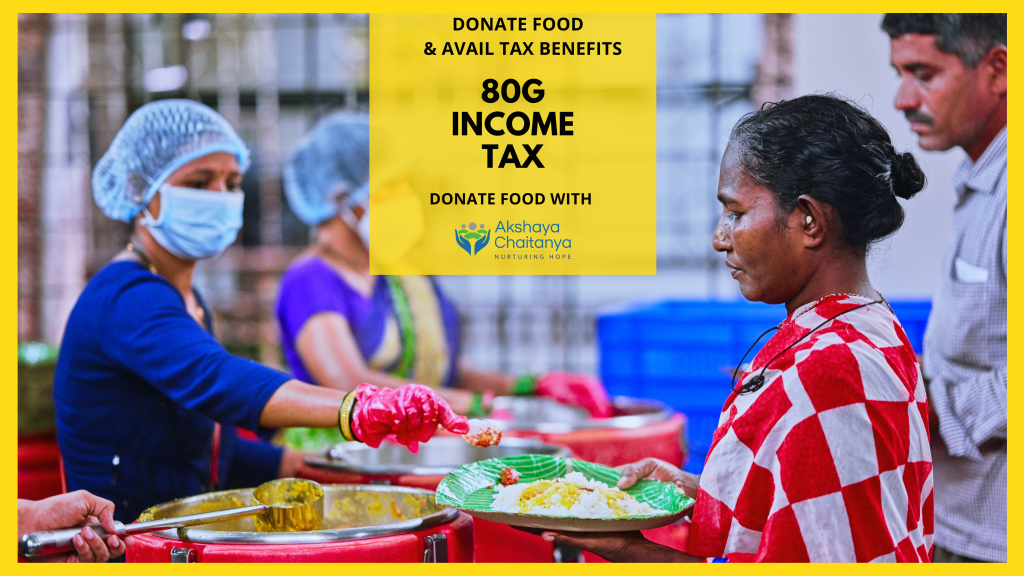Charity is a noble gesture. And through the power of charity, Akshaya Chaitanya has been a pivotal force in helping change the face of charity in India through its mission to eradicate hunger by providing food to the underprivileged in Govt. schools, Govt. hospitals and slums in impoverished areas of Mumbai.
It has the power and potential to change lives and it is fully acknowledged by the government of India. Section 80G of the Indian Income Tax Act allows a tax deduction when an individual donates to certain charitable institutions. You can claim tax deductions under this section and save taxes. When you donate to an NGO in India you can claim either a 50% or 100% deduction in tax. However certain rules and regulations are to be considered when you try to avail the benefits of Section 80G
Understanding what is Section 80G:
(If possible start this with “Section 80G is ….” )Section 80G of the Income Tax Act was introduced by the government of India to incentivise donations. The aim is to encourage individuals and organisations to donate to social causes by offering them financial relief.
You must also note that not all donations are accepted under Section 80G but donations made to certain funds or institutions are only eligible. Therefore you must check thoroughly if the organisation is eligible for deduction under Section 80G before donating.
It is important to obtain a receipt to claim the 80G certificate from the organisation where you have donated. The receipt must mention the proper name, address, PAN no. of the institution with its registration number and the amount donated.
Basic Criteria for a Donation to be valid under Section 80G
Here are a few mandates for a donation to be valid under Section 80G:
- Donations should be made from taxable income only. Donations made from a non-taxable income will not be considered for deduction.
- Donations made only to the registered organisers are considered valid.
- Donations paid in cheque or cash qualify for a deduction but donations made in the form of any other material like food, clothes or medicines are not qualified for a deduction under Section 80G
- Donations made to a political party or foreign organisation are not eligible for deductions.
- NRIs can also avail the benefits of Section 80G if they have contributed to a registered fund.
How Does Section 80G Work?
You can claim a deduction under Section 80G after donating and save your taxes. The amount of deduction will be decided on several factors like how much was donated and to which organisation.
Form 10BE is required to support your claim for deduction while filing ITR and the deduction will be granted by the organisation only if the registered organisation has provided information about the transaction to the income-tax department.
Approval and Eligibility Criteria for NGOs in India
Institutions or NGOs must adhere to the guidelines decided by the Income Tax Department to qualify under Section 80G. The organizations seeking approval must meet all the norms related to their activities and adhere to statutory regulations with financial transparency. The organisations are eligible to issue tax-deductible receipts to donors after approval.
Significance of Section 80G in Promoting Charitable Giving:
Section 80G plays a significant role in promoting the feeling of empathy amongst the citizens of the country. Tax benefits act as a great incentive for individuals and organisations to make financial contributions for the betterment of society.
NGOs in India(hyperlink to Homepage) are working tirelessly to address social issues like education, health, and poverty and these organisations are heavily dependent on grants to run their initiatives. Section 80G acts as a great motivator for the corporations to direct their funds and resources towards these projects. The donations are often used for social projects like scholarships to underprivileged students, establishing healthcare facilities in remote areas and providing healthy meals to undernourished people — all of which contribute significantly to the well-being of society.
Section 80G for Empowering Individuals and Businesses:
Section 80G empowers individuals and businesses to actively participate in social work. By making financial contributions towards society — a viable choice for businesses, the government cultivates a sense of social responsibility and this sense of responsibility only grows with time. Organisations witness the miraculous changes in the lives of the people when they join hands with NGOs in India and these powerful stories of change help encourage them to continue the good work.
As Section 80G continues to be a driving force behind many businesses making significant contributions, we await an equitable society in a sustainable world.
Section 80G of the Income Tax Act serves as a medium for developing an empathetic and socially responsible society. The government wants to address several social issues by providing tax benefits to individuals and businesses who contribute to NGOs. With the help of Section 80G, Akshaya Chaitanya) is empowered to keep up the momentum and work significantly towards their respective causes. Guided by the spirit of ‘giving for good’ (donation page), Section 80G (trust deed tax excemption) not only is a way to save taxes but also save people from the evils of poverty.


